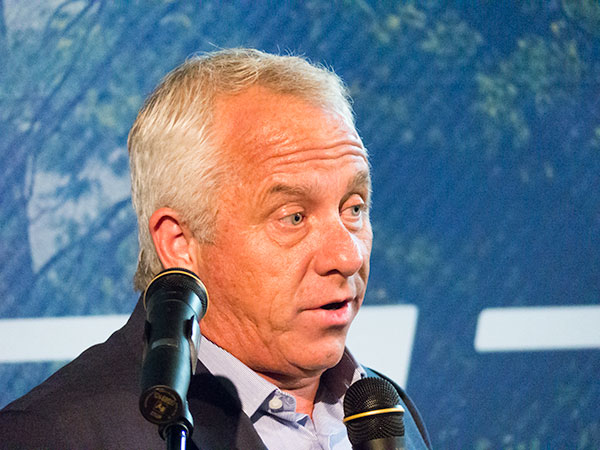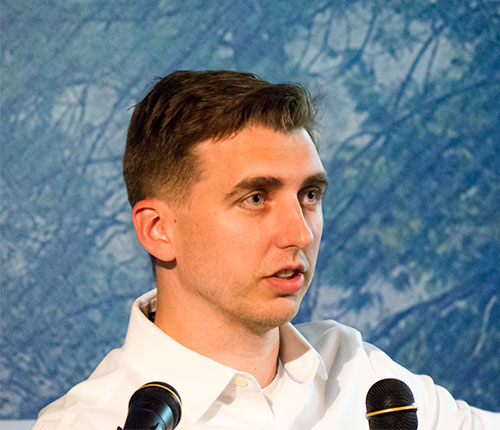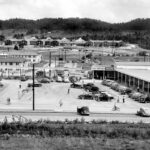
Greg LeMond, three-time Tour de France champion, celebrated the announcement of LeMond Composites, a new company he co-founded, during a ceremony on Wednesday afternoon, Oct. 12, 2016, at Heritage Center in west Oak Ridge. The company is expected to make composite bicycles and carbon fiber, and invest $125 million and create 242 new jobs. (File photo by John Huotari/Oak Ridge Today)
LeMond Composites of Oak Ridge has entered into a global, exclusive 20-year licensing agreement with Deakin University in Australia to commercialize their patent pending manufacturing process to increase production of high performance, low-cost carbon fiber, a press release said.
The licensed process will enable LeMond Composites to commercialize carbon fiber production faster than anyone else currently in the marketplace, the press release said.
“This means LeMond will deliver more of its low-cost carbon fiber faster to industries that benefit from using lighter, stronger materials, like those addressing global energy and transportation challenges,” the press release said.
“Deakin University’s process oxidizes carbon fiber faster, with lower capital and energy costs and greater output of carbon fiber over a shorter period,†said Nicolas Wegener, chief operating officer of LeMond, who negotiated the $44 million dollar deal. “The process requires 75 percent less energy and also reduces the amount of process equipment by 75 percent. These factors make the production of low-cost carbon fiber scalable at a velocity that can keep up with the market demand.â€
“The ability to scale production, along with our low-cost carbon fiber is what will allow LeMond Composites to deliver this material to the masses,†said Greg LeMond, three-time Tour de France champion and chief executive officer and founder of LeMond Composites. “Deakin University’s manufacturing process will make it possible to localize manufacturing and make carbon fiber technology more accessible to a wider range of industries like transportation, renewable energy, and infrastructure—or any industry that benefits from using lighter, stronger, safer materials.â€

Nicolas Wegener, chief operating officer of LeMond Composites (Photo by John Huotari/Oak Ridge Today)
Deakin University Vice-Chancellor and President Professor Jane den Hollander said the new technology, developed by its carbon fiber research center, Carbon Nexus, was a game-changer for the future of manufacturing.
“This new technology could revolutionize the advanced manufacturing sector around the globe because it will make carbon fiber more affordable to produce, which will make it more accessible for consumers,†den Hollander said.
LeMond Composites is about to secure its first supply agreement with a commercial customer, and will use the new process to manufacture and sell carbon fiber starting in September 2017, the press release said.
Although more widely known for his athletic accomplishments, LeMond has been an innovator throughout his life, according to the press release. In 1986, he was the first cyclist to win the Tour de France riding a carbon fiber bike. He also introduced clipless pedals, aerobars, and many other cycling innovations. His interest in carbon fiber and developing innovative products led to LeMond’s entry into the carbon fiber manufacturing industry in August 2016.
LeMond Composites’ team of carbon fiber experts and researchers includes Jamie Riddle, vice president of operations; David Church, vice president of engineering; Larry Peters, vice president of manufacturing; and Mike Hamby, facility operations and equipment manager, the press release said. The team’s search for the most innovative, efficient, and cost effective carbon fiber manufacturing process led them to this new technology and partnership with Deakin University, the release said.
“The immediate result of Deakin University’s licensed process is a low-cost carbon fiber product delivered in a standard format that is consistent with the requirements of today’s composite industry,” the press release said. “This ensures quick adoption of LeMond’s low-cost carbon fiber, which will initially be commercially available as a manufactured product from the Carbon Nexus facility.”
The press release said LeMond will begin construction of a new commercial carbon fiber facility located in Oak Ridge. Construction will begin this year, the press release said.
Lightweight and strong, carbon fiber offers many advantages over more widely used materials, such as steel and aluminum. One sector where carbon fiber has shown great promise is the automobile industry, where there is a global push to increase fuel economy standards. In the United States, new corporate average fuel economy, or CAFE, standards have the automotive industry racing to achieve a fleet-wide average fuel economy of 54.5 mpg by 2025. Incorporating LeMond Composites’ Grail carbon fiber into passenger vehicles is a key strategy within the automotive industry to achieving the improved U.S.-based and global fuel economy standards, the press release said.
“Aside from transportation, carbon fiber has the potential to have a significant impact in areas such as wind energy and infrastructure,” the press release said. “For the wind power industry, carbon fiber can be used to make wind turbine blades longer and stronger, increasing their efficiency. Carbon fiber composites can also be used to build, reinforce, or repair bridges, tunnels, skyscrapers, and homes.”
“Partnering with Deakin University will facilitate our expansion into other markets and open doors that were not possible only a few years ago,†said David Church, LeMond’s vice president of engineering. “With cost no longer a barrier, carbon fiber has the potential to be a game changer in the marketplace, leading to products that are stronger, safer, and better for the planet.â€
About LeMond Composites
Founded in 2016, LeMond Composites is focused on the manufacture of high-volume, low-cost carbon fiber composites. With global applications in transportation, renewable energy, and infrastructure, low cost carbon fiber composites will be a key component in the future of efficient energy use. LeMond Composites is located at 103 Palladium Way, Oak Ridge, Tennessee. For more information, visit www.LeMond.cc.
About Deakin University
Deakin, named after Australia’s second prime minister, is a young contemporary university with a reputation for being innovative, nimble, and friendly. “We aspire every day to combine excellent research and outstanding teaching with a strong focus on the communities we serve,” the press release said. Deakin is ranked in the top 2 percent of the world’s universities in each of the major rankings, and ranking 214 in the Academic Ranking of World Universities (ARWU). Deakin researchers are making a difference through world-class research and innovation. Deakin has a strong sense of community and serves as an economic, social, and cultural catalyst enriching each of the communities it serves. For more information, visit www.deakin.edu.au.
More information will be added as it becomes available.
Do you appreciate this story or our work in general? If so, please consider a monthly subscription to Oak Ridge Today. See our Subscribe page here. Thank you for reading Oak Ridge Today.
Copyright 2017 Oak Ridge Today. All rights reserved. This material may not be published, broadcast, rewritten, or redistributed.





Leave a Reply